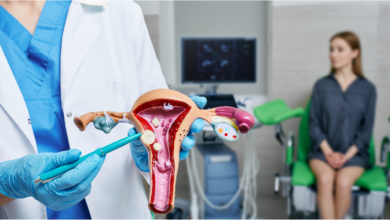Insulin Resistance
Insulin Resistance: Understanding the Causes, Symptoms, and Management

What is insulin resistance?
Insulin resistance is a condition in which the body’s cells become less responsive to insulin, a hormone that helps control blood sugar levels. This can lead to increased blood sugar levels, which may increase the risk of type 2 diabetes, heart disease, and other health problems.
What are the symptoms of insulin resistance?
The early stages of insulin resistance often have no symptoms. However, as the condition progresses, it can contribute to:
- Fatigue: Feeling tired or fatigued, even after adequate sleep.
- Weight gain: Difficulty losing or gaining weight despite maintaining a healthy diet and exercise routine.
- Skin darkening: Darkening of the skin in the armpits, groin, and neck (acanthosis nigricans).
- Recurrent infections: Recurrent infections, especially skin and urinary tract infections.
- Polycystic ovary syndrome (PCOS) in women: Irregular menstrual periods, excessive hair growth and acne.
Who can suffer from insulin resistance?
Anyone can develop insulin resistance, regardless of age, gender or ethnicity. However, certain factors can increase the risk, including:
- Obesity: Being overweight, especially around the waist, is a major risk factor.
- Inactivity: A sedentary lifestyle can contribute to insulin resistance.
- Genetics: A family history of type 2 diabetes or insulin resistance may increase your susceptibility.
- Age: The risk of insulin resistance increases with age.
- Hormonal factors: Conditions such as polycystic ovary syndrome (PCOS) can increase the risk.
- Medications: Certain medications can increase the risk of insulin resistance.
What are the types of insulin resistance?
• There are no specific “types” of insulin resistance. However, the severity and underlying causes can vary between individuals.
What diagnostic tests are available for insulin resistance?
• Healthcare providers may use the following tests to diagnose insulin resistance:
• Fasting blood sugar test: Measures your blood sugar level after not eating for at least 8 hours.
• Oral glucose tolerance test (OGTT): Measures your blood sugar level before and after drinking a sweetened beverage.
• A1C test: Measures your average blood sugar level over the past 2-3 months.
• Homeostatic model assessment of insulin resistance (HOMA-IR): A calculation based on your fasting blood sugar and insulin levels.
What is the treatment for insulin resistance?
Treatment of insulin resistance typically focuses on addressing underlying risk factors and improving insulin sensitivity. This may include:
• Lifestyle changes:
• Healthy diet: A diet rich in fruits, vegetables, whole grains, and lean proteins can help improve insulin sensitivity and promote weight loss.
• Regular exercise: Aim for at least 30 minutes of moderate-intensity exercise most days of the week.
• Weight loss: Losing even a small amount of weight can significantly improve insulin sensitivity.
• Medications: In some cases, medications may be prescribed to help manage insulin resistance and blood sugar levels.
What diet should I take?
A healthy diet is important for managing insulin resistance. Focus on:
• Whole foods: Choose unprocessed foods as much as possible.
• Fruits and vegetables: Aim to eat at least 5 servings per day.
• Whole grains: Choose whole-grain breads, pastas, and rice.
• Lean proteins: Choose lean sources of protein, such as fish, poultry, beans and pulses.
• Healthy fats: Include healthy fats found in nuts, seeds and olive oil.
• Limit added sugar: Reduce your intake of sweetened beverages and processed foods.
• Portion control: Pay attention to portion sizes to avoid overeating.
Which doctor of which specialization will treat insulin resistance?
• Endocrinologists
Can insulin resistance be completely cured?
Although there is no cure for insulin resistance, it can be effectively managed through lifestyle changes and medical interventions. The goal is to reduce the risk of complications, such as type 2 diabetes and heart disease. By making healthy choices and working closely with your healthcare provider, you can improve your overall health and well-being.





